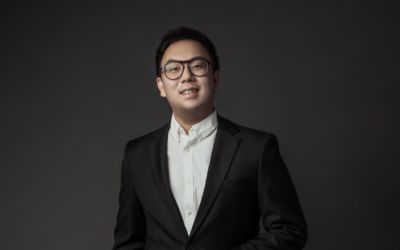Florence Gracia is a senior lawyer, experienced in merger and acquisition (M&A) transactions in a variety of sectors. In her role as Alpha JWC Ventures’ Legal Director, Florence undertakes any legal matters both on the fund management and deal execution, from negotiating up to closing investment deals and managing the legal and compliance side of Alpha JWC Ventures fund entities; a role comparable to a general counsel in other companies. As part of Alpha JWC Ventures value creation role, Florence also often assists portfolio companies by providing advice and recommendations regarding legal matters, especially in conducting corporate restructuring.
What Florence finds most interesting working with Alpha JWC is being closely involved with portfolio companies. As a part of the team overseeing these startups, Florence watches them grow from the ground up. Knowing that she is part of this growth is, Florence admits, a quite fulfilling experience.
Prior to joining Alpha JWC Ventures, Florence was a lawyer at SSEK Legal Consultant. The technicalities between the two posts are quite similar, the difference lies in the point of view that she has to take. In working with Alpha JWC and their portfolio companies, Florence has to be more pragmatic instead of idealistic; it is entirely different from working in a law firm, a path Florence has taken for the better part of the six years of her professional journey after receiving her bachelor’s degree in 2010.
Florence had always dreamed of taking a Master’s degree. Knowing that she couldn’t afford to study abroad without a scholarship, she decided to partake in Indonesia Endowment Fund for Education, also known as LPDP, in 2016. Florence’s initial plan was to pick school options from either the UK or the US, as they were the top choices for studying law. She acknowledged that she only had one chance to study abroad, thus strengthening her resolve that if she wanted to do it, she had to do it right. This thought was what led her to choose New York University and took the opportunity when she was admitted.
As she studied in the US, she noticed the differences between Indonesian law and American common law. In her six years of being a lawyer, she experienced several disagreements during negotiation with international companies — they tended to question Indonesian law while Florence herself didn’t understand their point of view. Studying in the US gave her insights on how to, in the future, navigate those kinds of negotiations.
Driven by the desire to seek as much experience as she possibly could, Florence took the New York State Bar Examination. The process to get there was one of Florence’s greatest challenges studying in the US. Through sleepless nights, Florence strived to at least try; so that by the end of the day she wouldn’t regret what she didn’t do instead.
Aside from the differences between the law of the two countries and the hard work she had to endure during New York State Bar Examination preparation, Florence also had to adapt with the US education system and culture. In this matter, she feels that Indonesia still leaves much to be desired. In Indonesia, students depend on their teachers to learn new subjects — no matter at which stage of education they are. Abroad, she found that students are obligated to read the required reading materials and seek their own knowledge before they enter the classroom. This culture, according to Florence, allows students to develop active learning and hone their critical thinking.
Throughout her period living in the US, Florence’s irrefutable fondness for Indonesia made her homesick often. Even after finishing the New York Bar exam, Florence had always planned to return and practice law in Indonesia. She took the exam not with the purpose of wanting to practice law in the US, but because she wanted to prove her worth to herself, and to expand her knowledge.
Joining Alpha JWC Ventures has been a bit of an eye opener for Florence. In her previous post, Florence had only delved into conventional industries, such as mining, plantation, and forestry. Alpha JWC Ventures has been Florence’s first experience diving into the tech industry, especially in startup companies.
“Even when I have years of experience of being a corporate lawyer, managing the legal side of startup transactions was a bit different than anything I have ever done before, so there are some aspects that I needed to learn about,” Florence said.
When Florence sees the bigger picture, the startup scene in Indonesia is at its prime time to be nurtured; they still have a long way to go, but they are on the right track to one day be able to thrive. For the past decade, new promising startups have started to emerge in Indonesia. By 2020, Indonesia has also been the home of five out of twelve unicorns in Southeast Asia, proving them to be capable of producing their own tech giants.
However, from the legal perspective, there are still many improvements that Indonesia needs to work on. Inherently, startups bring out new innovative ideas to approach and solve problems. This characteristic makes it hard for stakeholders to apply existing regulations on startups. There are still many unaddressed concerns; e.g. which ministry would a particular startup be under, which regulations it should follow, not to mention that there are some cases where regulations have not yet been applied. The couple of years when Gojek first started their operations, for example, there were many complications around its legal status as a public transport, despite two-wheeled vehicles based ride hailing being common practice in Indonesia. There are also some specific policies to be applied, such as P2P lending regulations by the Indonesian Financial Services Authority (OJK), and board portal registrations to the Ministry of Communication and Information Technology.
Even though Indonesia is not without their own shortcomings, Florence is still optimistic about Indonesia’s future in the technology sector and startup industries.
“Indonesia is still growing; the government is, admittedly, still learning. But it is a process better carried out by all parties involved — not only the policymakers. I know that several of our founders are actively involved in associations where business players could also give their input to the governments. I believe this kind of practice will give positive impacts for Indonesia’s growth.”

![[AlphaHub Writing Competition] Startup: A Wife’s Perspective [AlphaHub Writing Competition] Startup: A Wife’s Perspective](https://www.alphajwc.com/wp-content/uploads/2021/11/pexels-mikhail-nilov-6963871-400x250.jpg)

